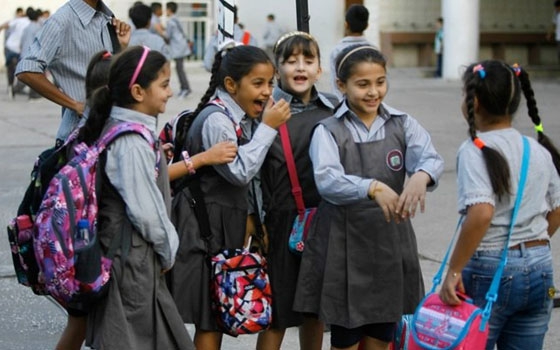The Italian Embassy announced a 2.4 million euro grant to support a rehabilitation program for public schools in Lebanon to be implemented by UNICEF.
The funding, roughly equivalent to $2.5 million, is part of the RACE II (Reaching All Children with Education) initiative organized by UNICEF and the Ministry of Education. The money is slated for projects to improve the physical condition of a number of school buildings throughout Lebanon, with an emphasis on those in particularly at-risk communities.
Eighteen schools, with a total of 5,000 students, will receive the funds provided by the Italian government. The grant will also help UNICEF, in collaboration with government ministries, to improve hygiene, health and safety and accessibility standards for children with special needs.
This new funding will also contribute to ongoing work that aims to address deep-seated problems within the Lebanese educational system.
“The public education sector in Lebanon was already under stress even before the Syrian crisis started,” Salam Abdul Munem, a communications officer at UNICEF, told The Daily Star. “It was seeing decreased registration and less-than-ideal physical conditions.”
Abdul Munem explained that prior to the rapid increase in the refugee population the full capacity of the Lebanese public school sector was between 300 and 350 thousand students. “Schools were already overburdened,” he said. “Moreover, the schools themselves were not ideal. Teachers were not properly trained and infrastructure was often poor.”
The RACE II program, according to Abdul Munem, was an attempt to address these inherent problems – especially in light of the pressure placed on the education sector by the influx of refugees from Syria.
This uptick in refugee populations dramatically increased the strain placed on the Lebanese education system – both on its human and physical resources. “We were doubling the number of children, and the stress placed on buildings and teachers,” said Abdul Munem. “It was inevitable that we had to work on the physical environment in these schools.”
Nevertheless, the RACE II project also aims to improve educational infrastructure in Lebanon even after the Syrian crisis comes to an end. “These improved schools will stay here even after the refugees return to their homes,” said Abdul Munem. “What is left is a school that is better than when the crisis started.”
According to UNICEF, the RACE initiative is one of the most significant educational efforts currently operating in the region. “This is our flagship program,” Abdul Munem said. “It’s really looking at long-term support to the educational system in Lebanon, and moving beyond just a quick response to the crisis.”
In a statement released, Italian Ambassador Massimo Marotti emphasized Italy’s commitment to educational programs in Lebanon. “Italy is a longstanding partner of UNICEF and the Ministry of Education, especially through the RACE Program,” he said.
According to the statement, the Italian government has already contributed 12 million euros ($12.7 million) to fund educational initiatives throughout Lebanon.
RACE II is also part of a broader effort sponsored by UNICEF, other U.N. agencies and NGOs called “No Lost Generation.” The initiative is a comprehensive program aimed at improving conditions for children in Lebanon, Jordan, Turkey, Iraq and Egypt affected by the Syrian crisis.
The Daily Star
November 24, 2016






















































